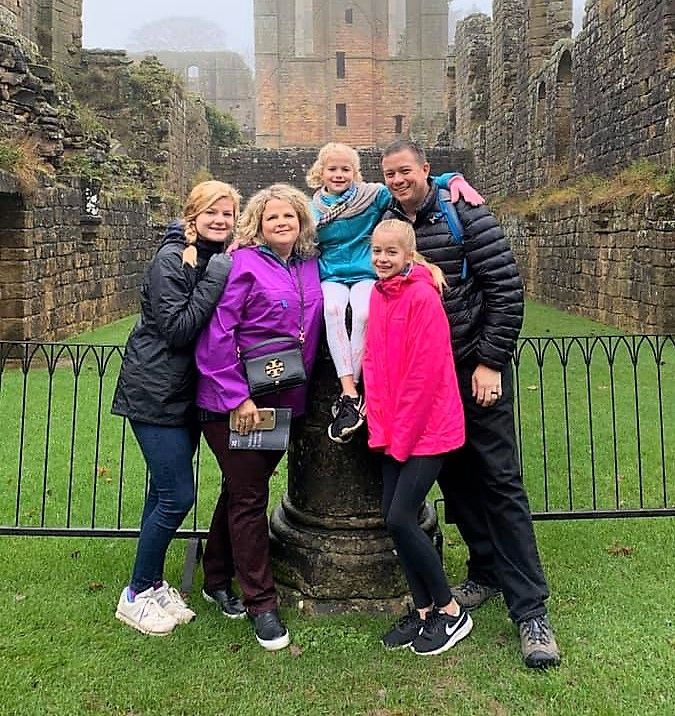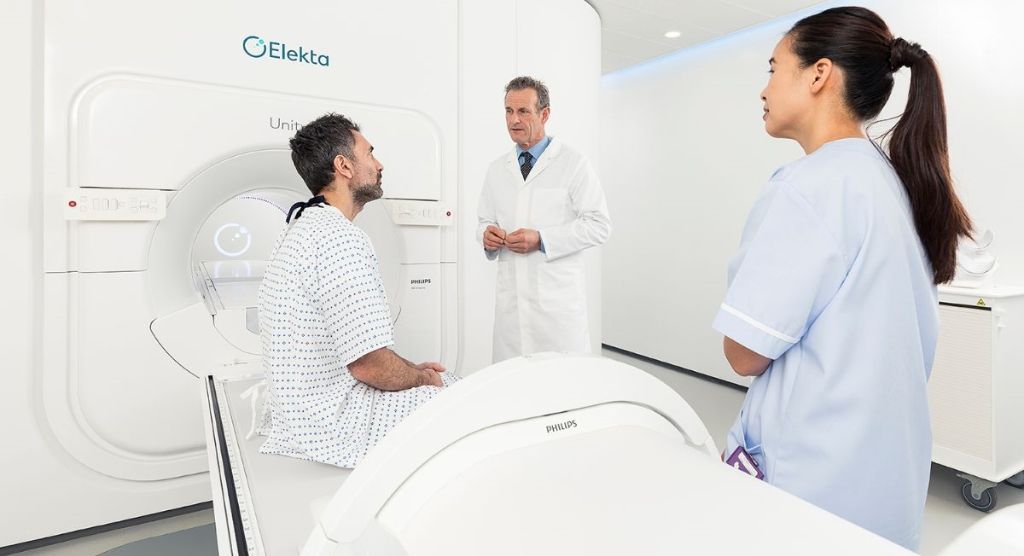Vigilance a key part of catching cancer early

Elekta’s Alex Hill shares his diagnosis and treatment for testicular cancer on National Cancer Survivors Day

When it comes to discovering lumps or bumps in or on one’s body, denial and wishful thinking that they’ll just go away is a poor strategy, according to Alex Hill, Healthcare Account Director for Elekta (Georgia, northern Florida) and testicular cancer survivor.
“My advice to anyone who notices something like that is get it checked out and checked out early,” he says. “If it’s cancer, in all likelihood it can be treated. If you ignore it, it probably won’t go away and it could kill you.”
Around Christmas 2018, Alex, then 46, had felt a hard nodule – no larger than a grain of sand – on his left testicle. In a perhaps forgivable assumption given the size of the painless bump, he thought it was scar tissue leftover from a vasectomy eight years earlier. Less than a month later, the lump had grown to pea-size.
“I thought well that’s a little weird – maybe something’s plugged or it’s some kind of benign swelling,” he recalls. “By the time I went to my urologist in late February 2019, it had grown to two-and-a-half centimeters – almost an inch across. It had grown really quickly and taken over the entire testicle.”
Convinced it was testicular cancer, the specialist sent him for an ultrasound scan, which revealed an “obvious tumor mass,” Alex says. The diagnosis was stage 1B testicular cancer, indicating the possible presence of tumors in the pelvic lymphatic system. A CT scan, however, didn’t detect any trace of additional tumor volume.
“The urologist said if you’re going to get cancer this is the one to get.”
“News of the diagnosis hit me like a five or six on a one-to-10 scale,” he remembers. “I was hoping the urologist would tell me something different, but I had prepared myself for the worst-case scenario. The good thing was that he told me testicular cancer is an extraordinarily treatable, very responsive type of cancer. The cure rates for men with stage 1 and stage 2 ranges from 96 to 97 percent. The urologist said if you’re going to get cancer this is the one to get.”

The road to healing
The physician scheduled Alex’s radical inguinal orchiectomy for the very next week (February 27, 2019), a procedure that removes the affected testicle through a three-inch incision below the navel. While “radical,” the treatment took just 30 minutes under general anesthesia; but the complete treatment also called for a round of chemotherapy several weeks after surgery.
“The chemotherapy sterilizes men, which was not an issue for me due to the vasectomy – the testicle had served its purpose kid-wise,” he says. “Unfortunately for the younger guys in their 20s who get testicular cancer, maybe they put off treatment and didn’t act right away. That means they have to bank their sperm if they want children later and endure multiple chemo cycles and potentially a really invasive surgery to remove the entire pelvic lymphatic system.”
On April 20, 2019, Alex began eight days of chemotherapy spread out over a three-week period. Like many undergoing systemic treatment, he remembers “you just don’t feel great. You get home from chemo and you just want to take a nap.” On day 20 of chemotherapy – the exact date the oncology nurse predicted – he began to lose his hair.
“I was in the shower washing my hair and it started coming out in clumps. I asked my middle daughter if she wanted to shave my head and she was like ‘Oh yeah!’”
“I was in the shower washing my hair and it started coming out in clumps,” Alex says. “I asked my middle daughter if she wanted to shave my head and she was like ‘Oh yeah!’”

Not functioning at 100 percent due to the side effects of chemotherapy, Alex took medical leave for the end of April and most of May 2019.
“We had a sales meeting in June 2019 which I attended,” he says. “I didn’t feel great, but I felt like it was kind of a critical thing to do. It was an important step to get back to normal.”
Heightened perspective
A committed employee of a cancer management company for many years, Alex has always been an ardent supporter of his customers. His experience brought this dedication to a new level.
“I’d like to think I was a customer advocate before all this went down – trying to do the best thing for customers striving to help their patients,” he says. “My cancer journey amplified that mind-set. If I were one of my customer’s patients, how would I feel if a treatment machine went down, or if I didn’t have access to the right type of care, or if there was an error on my record that led to a mistreatment?
“’I’ll raise my voice on behalf of customers if it will add any urgency to our response.”
“Frankly, the experience has sometimes turned me and colleagues who have had cancer into real jerks with our coworkers when our customers are being impacted,” Alex adds. “Because from the patient perspective, their lives are being impacted. I’ll raise my voice on behalf of customers if it will add any urgency to our response. Bear in mind, I’m not proud of my behavior, but I’m really proud of my customer advocacy to get things done for them and their patients.”

End of the road – in a good way
Two years after his cancer treatment, Alex is now in surveillance mode, periodic blood work and diagnostic scans to ensure the illness has not made an encore.
“It’s sort of status quo moving on,” he says. “I’m getting a CT annually, x-ray semi-annually and blood work quarterly to check for tumor markers. As long as results come back stable, I’m in post-treatment survivor mode and looking to see what the five-year outcome is.”
Alex’s advice to anyone who notices something strange about their body – a lump, a bump or they’re just not feeling right – is to get to the bottom of it quickly.
“For testicular cancer in particular, if something feels weird down there, go get it checked out.”
“For testicular cancer in particular, if something feels weird down there, go get it checked,” he says. “Yes, it’s an embarrassing kind of condition and an awkward question to ask your urologist or GP, but these guys and gals deal with this on a daily basis. Don’t be embarrassed. The worst thing you can do is ignore it because it’s not going to just go away.”





